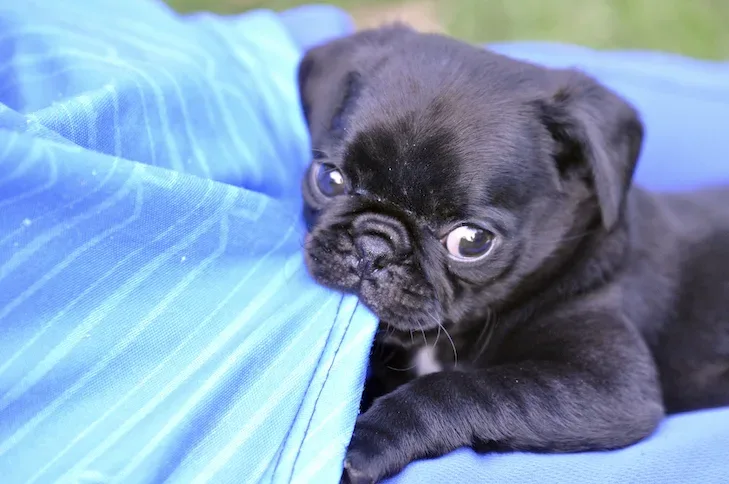I’ll never forget the day I brought Rocky home – a tiny ball of fluff with the most endearing habit. As I settled him into his new bed, he immediately gravitated toward his soft fleece blanket. At first, I thought he was just sniffing it, but then I noticed the distinct sucking motion. He’d gather a corner of the blanket in his mouth, curl up tight, and contentedly suckle away.
This behavior sparked my curiosity. Was it normal? Should I be concerned? As it turns out, blanket sucking is a common comfort behavior in dogs, deeply rooted in their early life experiences.
Table of Contents
Why Do Dogs Suck on Blankets?
Dogs suck on blankets for various reasons:
- Nursing memories: The behavior mimics the nursing experience with their mother
- Comfort seeking: Blankets provide a sense of security and warmth
- Stress relief: Some dogs use it as a self-soothing mechanism
- Natural instinct: It’s part of their inherent comfort-seeking behavior
Rocky’s blanket-sucking ritual became part of his daily routine, particularly before bedtime or during thunderstorms. While some might see it as unusual, I’ve learned it’s his way of finding comfort in our busy household.
Understanding the Behavior
The sight of Rocky sucking on his blanket reminds me of a newborn puppy nursing from their mother. This behavior isn’t just a random habit – it’s deeply rooted in their earliest life experiences. When puppies are born, they spend countless hours nursing, creating a powerful association between suckling and comfort.
The Mother-Puppy Connection
Puppies typically nurse for the first 6-8 weeks of their lives. During this time, they learn that suckling brings:
- Nourishment
- Warmth
- Safety
- Bonding with their mother
These early experiences create lasting neural pathways in a puppy’s brain, connecting the act of sucking with feelings of security and contentment.
Blankets as Comfort Objects

Rocky’s blanket serves as more than just a piece of fabric – it’s his personal comfort object. The soft texture and familiar scent trigger those same feelings of security he experienced as a puppy. I’ve noticed he particularly seeks out his blanket during:
- Thunderstorms
- New environments
- Times when I’m away
- Before bedtime
The Anxiety Connection
Dogs, like humans, experience various forms of anxiety. The rhythmic motion of sucking on blankets releases endorphins in their brain, creating a natural calming effect. I’ve observed Rocky’s blanket-sucking intensify during stressful situations, acting as his personal coping mechanism.
Also Read: Puppy Bad Breath: Why Does My Puppy Have Bad Breath?
This self-soothing behavior isn’t limited to blankets – some dogs might suck on:
- Stuffed toys
- Pillows
- Their own fur
- Specific spots on their body
Understanding that blanket sucking often represents your dog’s attempt to recreate those early feelings of safety and comfort, is crucial. For Rocky, his blanket has become a portable source of security, helping him navigate through various emotional states.
Blanket Sucking Across Different Life Stages

I’ve watched Rocky’s blanket-sucking habits evolve from his puppy days to adulthood. The way puppies interact with blankets is distinctly different from adult dogs – it’s like watching two different movies with the same actor.
Puppyhood: Energetic and Playful
As a puppy, Rocky would bounce around with his favorite blue blanket, creating an entertaining spectacle. He’d drag it from room to room, occasionally stopping to suckle while pawing at it playfully. His blanket sessions were energetic affairs, filled with tail wags and excited little hops. He’d often wrap himself up like a furry burrito, sucking on one corner while kicking his tiny legs in pure joy.
This behavior isn’t unique to Rocky; it’s quite common among puppies. According to canine behavior experts, such behaviors are often linked to their developmental stage and can be influenced by various factors including breed and environment.
Adulthood: Calm and Ritualistic
Adult dogs display a calmer approach to blanket sucking. Rocky now treats his blanket time as a sacred ritual – he’ll carefully choose his spot, usually his bed or the living room corner, and methodically arrange the blanket before settling down for a prolonged sucking session. It’s become his way of unwinding after a long day.
Breeds Likely to Maintain Blanket Sucking Behavior
Some breeds are more likely to maintain this behavior into adulthood:
- Doberman Pinschers
- Golden Retrievers
- Labrador Retrievers
These breeds often exhibit similar behavioral patterns as they grow older, which can be attributed to their genetic predispositions.
Variability in Intensity and Frequency
The intensity and frequency of blanket sucking can vary significantly between dogs. Some might only seek their blanket during stressful situations, while others, like Rocky, incorporate it into their daily routine. I’ve noticed he particularly gravitates toward his blanket during quiet evenings or after intense play sessions.
This variability is also noted in dog behavioral studies which suggest that individual experiences and personality traits play a significant role in shaping such behaviors.
Maturation: Controlled and Purposeful Behavior
This behavior often becomes more controlled and purposeful as dogs mature. They develop specific preferences for certain blankets, spots in the house, and times of day for their sucking sessions. Such changes are part of the natural progression in a dog’s life stages as outlined in various canine behavior insights.
Interestingly, this blanket-sucking behavior may have deeper roots than we realize. For instance, some researchers have explored how ancient breeds like the Carolina dog exhibit similar traits due to their unique evolutionary backgrounds.
When to Be Concerned
While Rocky’s blanket-sucking habit remains relatively mild, I’ve learned to recognize signs that might indicate when this behavior needs attention. Here are key warning signals that suggest it’s time to consult a veterinarian:
- Obsessive Behavior: Your dog can’t be distracted from blanket sucking, even during meals or playtime
- Physical Signs: Raw or irritated areas around the mouth from excessive sucking
- Sleep Disruption: Waking up multiple times to find and suck on blankets
- Anxiety Symptoms: Pacing, whining, or destructive behavior when blankets aren’t available
- Ingestion Risk: Attempting to eat or tear pieces of the blanket
Certain breeds display a higher tendency toward compulsive behaviors. Doberman Pinschers often exhibit flank sucking, while breeds like German Shepherds and Border Collies might develop intense fixations with objects. My friend’s Doberman started showing signs of flank sucking at age two, requiring professional intervention to manage the behavior.
I’ve noticed breed-specific patterns during my visits to local dog parks. Working breeds seem particularly susceptible to developing these habits, especially when under-stimulated. A local veterinary behaviorist explained that these dogs’ high intelligence and drive can sometimes manifest in repetitive behaviors if their needs aren’t fully met.
Mitigating Excessive Blanket Sucking
I’ve found several effective ways to help Rocky reduce his blanket-sucking behavior. Creating an enriching environment with interactive toys and puzzle feeders keeps his mind occupied and redirects his attention from the blankets.
Here’s what works best for us:
- Hide treats around the house for a fun treasure hunt
- Use Kong toys filled with frozen treats
- Set up obstacle courses in the backyard
- Practice new tricks and commands daily
Physical exercise is crucial – I take Rocky for two brisk walks daily and let him run freely at the dog park. The combination of mental stimulation and physical activity has significantly reduced his anxiety levels and blanket-sucking tendencies.
A tired dog is a happy dog! When Rocky gets enough exercise, he’s less likely to seek comfort in blanket sucking. I’ve noticed he’s much calmer and more content after our daily training sessions and physical activities.
Conclusion
Living with Rocky has taught me that understanding dog behaviors goes beyond just observing their actions. His blanket-sucking habit reminds me that our furry friends need both physical comfort and emotional security. Creating a nurturing environment means finding the right balance between accepting their natural behaviors and guiding them toward healthy habits.
I’ve learned to read Rocky’s signals better – knowing when his blanket time is just comfort-seeking and when it might indicate stress. This awareness helps me provide the support he needs, whether it’s extra playtime, a cozy corner, or simply my presence nearby.
Remember – each dog is unique. What works for Rocky might not work for your pet. The key lies in staying attentive to your dog’s needs while fostering a safe, loving space for them to thrive.
FAQs (Frequently Asked Questions)
Why does my dog suck on blankets?
Dogs may suck on blankets as a comfort behavior, often stemming from their suckling instinct developed during puppyhood. This behavior can provide them with a sense of warmth and security, especially if they associate the blanket with positive early experiences.
Is blanket sucking common in puppies?
Yes, blanket sucking is quite common in puppies. It often manifests as playful interactions with the blanket, reflecting their natural suckling instinct. As they grow, some dogs may continue this behavior into adulthood.
When should I be concerned about my dog’s blanket sucking?
You should be concerned if your dog’s blanket sucking becomes excessive or compulsive, which could indicate underlying anxiety or stress. Signs include persistent sucking that interferes with their daily activities or well-being.
How can I reduce my dog’s excessive blanket sucking?
To mitigate excessive blanket sucking, engage your dog with mental stimulation and physical exercise. Providing toys and activities can distract them from the behavior and help reduce anxiety levels.
Are certain dog breeds more prone to compulsive behaviors like blanket sucking?
Yes, some breeds are more susceptible to compulsive behaviors, including flank sucking and blanket sucking. It’s important to monitor these behaviors and consult with a veterinarian if they become problematic.
What can I do to create a comforting environment for my dog?
Fostering a comforting environment involves understanding your dog’s needs and behaviors. Ensure they have access to safe spaces, engaging toys, and regular exercise to help them feel secure and relaxed.

